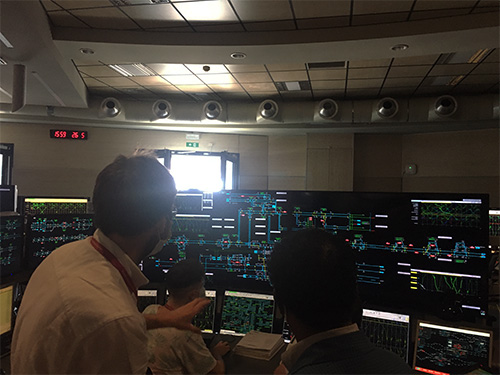The FS Italiane Group welcomes Ethiopian Railways’ Top Management
FS Italiane and Italferr present the Group’s technologies and skills to the Ethiopian delegation interested in the development of mobility and infrastructure in their country

04 June 2021
After a year of the pandemic, which blocked any direct contact between international railways and left only the option of resorting to virtual interactions, FS Italiane saw the return of foreign delegations visiting their plants just as soon as it was possible following the reopening.
Indeed, on 26 May, the FS Group welcomed a high-level delegation from the Ethiopian Railways Corporation (ERC) interested in learning about and – where possible – trying out the technologies and experiencing the professionalism of the Italian railway system, further strengthening the already-solid relationship of collaboration with the Group. At the Roman headquarters of Villa Patrizi, FS and its subsidiary Italferr, the Group’s excellence was illustrated to Mr Yohannes Sintayehu W. Michael, CEO of ERC, and Mr Zenebe Sileshi Kassa, Technical Advisor of ERC, through a presentation of the skills acquired and the main solutions implemented to improve efficiency and develop the system of mobility in Italy.
Subsequently, FS and Italferr offered their guests the opportunity to travel aboard a Frecciarossa 1000 and to visit the PCS Network Control Room in Bologna, as the railway traffic command, control and management room for a significant section of the Italian network.
FS also arranged a meeting between the Ethiopian delegation and the Directorate General for Development Cooperation of the Ministry of Foreign Affairs and Cooperation (MAECI) to address the issue of railway infrastructure development in Ethiopia with Italian support. The Ethiopian delegation, which did not fail to show its heartfelt appreciation for the experience, reiterated its openness to new partnerships with the FS Group.
Italferr – which has been present in Ethiopia since 2014 with its own headquarters and has worked on various projects both with ERC and with other locally-operating entities (the World Food Program and the Ethiopian Road Authority) – is developing the Strategic Master Plan for Transport with the Territory Studies and Planning (SPT) for the Ethiopian Ministry of Transport and the Ethiopian Road Authority, being financed by the African Development Bank.
The meeting was thus also a beneficial opportunity to present the transport model developed for forecasting traffic demand as part of the Master Plan, the initial results of which highlighted a significant convergence with the expectations of Ethiopian Railways on the subject of identifying grid development priorities.
Another aspect of particular importance resulting from the discussions was the possibility of restarting the dialogue on the support that Italy – through the MAECI – can offer to the development of the potential railway connection between Ethiopia and Eritrea, which would provide the landlocked African country a second alternative to the port of Djibouti.
Further possible collaboration opportunities involve other railway projects that Ethiopia has been carrying out for some years, including the completion of the new Addis-Weldya-Mekkele line and the construction of several interports.